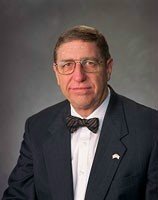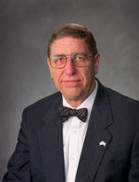A high level debate has emerged about the future of energy. The sides see two very different outcomes if energy use continues to grow.
Actually, the underlying debate is not so much about energy growth as it is about how we produce energy. One side asserts carbon based energy production is a problem that must urgently be solved by government intervention. The counter position is that the carbon problem will be solved very quickly by science, engineering and entrepreneurship. Government ought to get out of the way.
The adversarial spokespeople for each side are Al Gore and Bob Metcalfe. Both were part of the last great technology paradigm shift: the internet.
Al Gore entered congress in 1976 and made support for the first wide area packet switching network called ARPANET (which became the internet) a government priority. According to Gore, what worked for the internet will work for energy. The former Vice President of the US tells us if government does not intervene in the use of energy (or at least the way we generate it) the planet will fail to support life as we know it.
On the other side is Bob Metcalfe the inventor of a local-area networking standard he called Ethernet 36 years ago next month (May 22, 1973). Metcalfe also sees the internet model as the same model that will apply to energy but he has a different take. He sees a future of unlimited nonpolluting energy springing from invention and commercialization to satisfy consumer demand.
Gore advocates "Persuading individuals, families, communities, states, corporations and other organizations to begin to quickly and meaningfully reduce their own global warming pollution—and to offset the remainder—in order to become "carbon neutral." (Link: http://www.climateprotect.org/about/alliance).
Gore's powerful presentations have brought him more than a Nobel Prize - he may in fact have been partly responsible for changes of government in Australia and the US. Here is the latest "short version" of his presentation: (Link: http://www.ted.com/index.php/talks/al_gore_s_new_thinking_on_the_climate_crisis.html).
Please take a moment to watch it. I saw him do the original presentation at the Chautauqua Institution in New York three years ago. He is a better presenter now and he makes his arguments more powerfully.
Metcalfe's opposing view sees us leaping over the carbon problem and launching into the era of the "Enternet" where use of carbon based fuels are no longer a problem because the centralized power generation model they represent will fail to attract new investment. Here is Metcalfe's presentation: (Link: http://earth2tech.com/greennet-09-presentations/bob-metcalfe).
Former Vice President Gore is trying to bridge the divide between the positions. last week he urged US lawmakers to put aside differences and act quickly. A good report of his presentation and reactions to it are here: (Link: http://news.yahoo.com/s/ap/20090424/ap_on_go_co/us_climate_hearings_37). The text of what he said is here (Link: http://energycommerce.house.gov/Press_111/20090424/testimony_gore.pdf).
If you would like to see the distributed generation model explained compellingly read Perfect Power by Robert Galvin and Kurt Yeager. This book published earlier this year explains how the microgrid revolution will unleash cleaner, greener, and more abundant energy.
Next week it will be my privilege to be on the same rostrum with Kurt Yeager, a former President of the Electric Power Research Institute (EPRI) at one of North America's most far thinking energy organizations: The Peak Load Management Alliance (PLMA) at their Spring Meeting in Annapolis.
I am introducing a panel on Electric Vehicles and Plug-in Hybrids: Effect on the Grid as the Vice President of Development of Aztech Associates Inc.
Aztech offers a way for consumers to watch their energy use, including vehicle charging, on an always-on In-Home Display or IHD. Aztech invented this term and today these energy monitors have become the face of the smart grid in tests and deployments across North America.
Innovative companies like Aztech, who created a new energy product category like the IHD without government investment, will lead us into Bob Metcalfe's era of the Enternet.


1 comment:
Gardner, I would like to learn more about the residential use of the Azteh products you refer to in your post.
As far as the opposing views you describe, taking the rhetoric of the leaders aside, this is indeed about challenging the long outstanding status quo on national and multi-national energy production.
IP packet switching networks, as an alternative to proprietary, vendor-specific closed systems of the 1970s and 1980s, serve as a powerful reminder of how rapid and powerful market reaction can be to the disruptive technological change agent, something the established industries and their political supporters fear.
Post a Comment